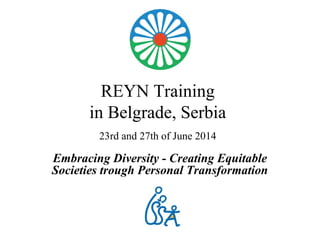Reyn training in belgrade, serbia 2014
- 1. REYN Training in Belgrade, Serbia 23rd and 27th of June 2014 Embracing Diversity - Creating Equitable Societies trough Personal Transformation
- 2. Trainers: ŌĆó Zorica Trikic, MA, ISSA Senior Program Manager and Romani Early Years Network Coordinator ŌĆó Jelena Vranjesevic, PhD, Faculty of Philosophy, Belgrade University
- 3. Participants: ŌĆó There were 28 participants from 13 countries: ŌĆó Serbia, Macedonia, Montenegro, Bosnia and Herzegovina, Kosovo, Albania, Italy, Belgium, Latvia, Ireland, Ukraine, Bolgaria and Hungary
- 4. With amazing people in the wonderful atmosphere in Belgrade
- 5. We did:
- 6. Day1. WeŌĆÖve learned about ourselves: the common portrait of participant ŌĆó Direct and honest ŌĆó Volunteer ŌĆó Humanitarian studies (philology, psychology, sociology, pedagogy) ŌĆó Active ŌĆó Lifelong learning ŌĆó REYN member =)
- 7. Day1. WeŌĆÖve learned about problem solutions Naming (giving a proper name for the problem) Voicing (active involvement trough dialogue) Building allies (we cannot solve it alone, we need team)
- 8. Day1. WeŌĆÖve learned about stereotypes and prejudices by playng ŌĆ£DerdiansŌĆØ game ŌĆó Stereotypes have real power ŌĆó Prejudices include strong emotional relations ŌĆó Prejudices are resistant to change ŌĆó Stereotypes are unjustified generalizations ŌĆó We jumped into stereotypes about ŌĆ£wildŌĆØ and ŌĆ£illiterateŌĆØ derdians even being aware of power of prejudices
- 9. Day2. WeŌĆÖve learned about DIE model ŌĆó We usually jump from description of fact (what we really see) to interpretation of it without knowing the real situation and than we evaluate it so that we easily can come to discrimination ŌĆó Instead of DIE model more close to truth is making assumptions about probable reasons that cause fact Interpretation Evaluation Description
- 10. Day2. WeŌĆÖve learned about ŌĆ£Blaming the victimŌĆØ mechanism by ŌĆ£Building towersŌĆØ game ŌĆó ŌĆ£Blame the victim theoryŌĆØ places causes of social problems in one who is suffering, and not in characteristics of his living conditions Problems are explained/solved without changing the conditions that create them. ŌĆó Paradox of competetive individualism is in belief that the personal gain is the most important, that the others are less important, which hinders the development of individuality.
- 11. Day2. WeŌĆÖve learned about oppression and itŌĆÖs manifestations ŌĆó oppression matrix; ŌĆó explicit/implicit, conscious/unconscious oppression; ŌĆó the cultural/institutional and individual level of oppression
- 12. Day3. WeŌĆÖve learned about openness by playing ŌĆ£Fruit gameŌĆØ ŌĆó To avoid drama ŌĆō separate feelings from thoughts ŌĆó Focusing on our feelings about otherness ŌĆó Development of intercultural sensitivity ŌĆó Risk factors in intercultural learning ŌĆó Needs inventory
- 13. Day3. WeŌĆÖve learned about ŌĆ£Building allies ŌĆō how to be an effective allyŌĆØ ŌĆó Empathy (quality listening, focusing on otherŌĆÖs needs, reflection of otherŌĆÖs feelings, noticing otherŌĆÖs physical and emotional state) ŌĆó Effective ally (knows whatŌĆÖs opression, understands situation, responses to target group, expects support from other allies, knows that he/she is responsible for humanizing society, has his/her own identity, has patience and good sense of humor)
- 14. And some useful tips from training provided by Zorica-dawn: ŌĆó Build allies ŌĆó Share responsibility ŌĆó Awareness ŌĆó Focus on needs ŌĆó DonŌĆÖt use position either/nor ŌĆó Openness ŌĆó Always ask yourself: what will make life more beautiful?














